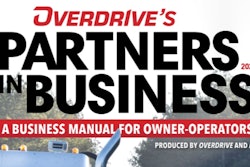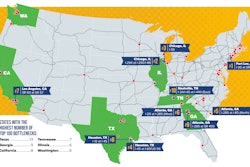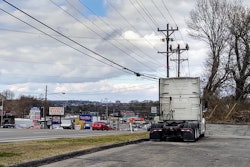Trucking news and briefs for Friday, Feb. 16, 2024:
ELD makers’ legal battle ramps up
The legal battle between electronic logging device providers Motive and Samsara is picking up steam following Samsara’s opening salvo last month filing suit against Motive for allegedly stealing intellectual property. In the latest development, Motive countersued, alleging similar theft on the part of Samsara, among other things.
San Francisco-based Samsara, which provides ELDs, telematics, dash cameras and more, claimed fleet management provider Motive Technologies Inc. has engaged in illegal conduct that includes patent infringement and false advertisement.
 Motive has filed a lawsuit against Samsara for copying its dashcam technology, among other things.Motive
Motive has filed a lawsuit against Samsara for copying its dashcam technology, among other things.Motive
Samsara asserted in the complaint that Motive is copying Samsara’s patented technology at all levels, including the overall structure of its system, the AI applications it offers to analyze customer data, the look and feel of the user interface for its telematics and safety solutions, and the IoT hardware devices (dash cameras, etc.) that collect the necessary data and enable all follow-on services.

Samsara requested the ITC issue an exclusion order and a cease-and-desist order to prevent Motive’s Vehicle Gateway and dashcam products from being imported into the United States and to prohibit Motive from selling, marketing, advertising or distributing those products.
Motive has maintained that it believes Samsara is actually the company that copied its technology instead.
"This legal maneuver is yet another attempt by Samsara to limit competition after failing to develop competitive AI technology," the company said following the ITC complaint. "More than 30 Samsara employees, including Samsara’s leadership team, have illegally used Motive’s product dating back to 2016 to copy its functionality. Motive will fight this anti-competitive behavior to the fullest extent."
Just days after the ITC compliant, Motive filed the aforementioned countersuit against Samsara in the Northern District Court of California alleging patent infringement.
“For years, Samsara has engaged in unlawful, anticompetitive business practices to copy Motive’s products and technology and to steal its intellectual property,” Motive said. “Despite its efforts, Samsara has failed to develop competitive AI technology and has been losing customers, particularly large Enterprise accounts, to Motive. Rather than develop better products, Samsara has resorted to waging a meritless legal battle and associated marketing campaign against Motive in an underhanded attempt to limit competition and stifle innovation.”
Motive’s suit alleges patent infringement, theft of intellectual property and trade secrets, fraud, false and deceptive advertising, defamation and intentional interference with prospective economic relations. Samsara’s lawsuit, filed Jan. 24, uses the same language, alleging that Motive has committed intellectual property theft and patent infringement in addition to false advertising and misleading marketing campaigns.
[Related: When ELD data sharing provides too much insight]
"Rather than stopping its unlawful conduct, Motive has decided to copy our claims,” Samsara said in a statement to Overdrive sister publication CCJ. “As demonstrated in our complaint, this is the same copycat tactic Motive uses for its product development. The allegations in Motive's suit are a deliberate distraction, and we have every confidence in our defense. We remain focused on putting an end to Motive's ongoing infringement and unlawful conduct to ensure fair competition, innovation, and safety for the entire industry.”
Both lawsuits accuse the other party of accessing each other’s platforms to copy technology.
Both companies have created web pages with details of each lawsuit: Samsara vs. Motive.
[Related: ELD maker Motive, formerly KeepTruckin, sued by competitor]
MATS relocates Truck Parking Community
The Mid-America Trucking Show's Truck Parking Community has been relocated.
The new location is 1016 Phillips Lane, Louisville, Kentucky, 40209, across from Gate 1 of the Kentucky Expo Center, where MATS will be held March 21-23.
Free tractor-trailer parking with shuttle service to and from MATS will be available courtesy of TA-Petro, which will also provide hot showers and portable restrooms within the lot.
The Truck Parking Community was previously housed in the Papa John’s Parking Lot at Cardinal Stadium.
[Related: ‘Over the Road’ episode 1: The biggest tailgate in trucking]
Michigan lifts spring weight restrictions across much of state
 Michigan's spring weight restrictions have been lifted on all state highways south of the Upper Peninsula, effective Feb. 16.Michigan DOT
Michigan's spring weight restrictions have been lifted on all state highways south of the Upper Peninsula, effective Feb. 16.Michigan DOT
The Michigan Department of Transportation has adjusted its spring weight restriction areas in an annual move to protect roads.
Effective 6 a.m. Friday, Feb. 16, weight restrictions were lifted on all state trunkline highways from the southern Michigan border north to and including US-2/US-141 at the Menominee River bridge west of Iron Mountain then east on US-2 to St. Ignace.
Frost restrictions are still in effect for the remainder of the state and will be imposed and enforced on all state trunkline highways north of US-2 and on M-185 on Mackinac Island. State routes typically carry M, I, or US designations.
In the restricted areas, the following will apply:
- On routes designated as "all-season" (designated in green and gold on the MDOT Truck Operators Map), there will be no reduction in legal axle weights.
- All extended permits will be valid for oversize loads in the weight-restricted area on the restricted routes. Single-trip permits will not be issued for any overweight loads or loads exceeding 14 feet in width, 11 axles, and 150 feet in overall length on the restricted routes.
- On routes designated as "seasonal" (designated in solid or dashed red on the MDOT Truck Operators Map), there will be a posted weight reduction of 25 percent for rigid (concrete) pavements and 35 percent for flexible (asphalt) pavements, and maximum speed of 35 mph for some vehicles.








